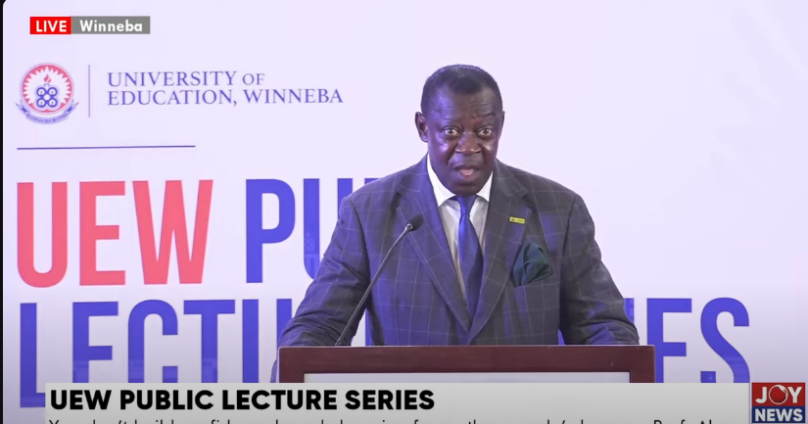Imagine walking into a room with two light switches: one controls a single-phase system, while the other controls a two-phase system.
If the single-phase system fails, the lights go out, leaving the room in darkness. But with the two-phase system, even if one phase fails, the other keeps the lights on.
For Professor Agyeman Badu Akosa, a renowned pathologist, academic, and social commentator, this analogy perfectly captures the state of intellectual engagement in Ghana.
"Most Ghanaians are like single-phase wires," Prof. Akosa told the audience during his address at the University of Education, Winneba (UEW) Public Lecture Series on April 11.
His words were simple but powerful: many in Ghana, he argued, are trapped in one-dimensional thinking, unable to engage with the complexities of the world around them.
In his keynote speech, Prof. Akosa emphasized that the reason for this limited thinking lies in the country's educational approach.
He compared the narrow, linear thinking to a single-phase electrical system: once one thought process or idea fails, there’s nothing to fall back on.
He challenged the audience to think critically about the current educational structure that keeps Ghanaians intellectually constrained and unable to process the complexities of modern life.
The heart of Prof. Akosa’s message focused on reforming Ghana’s education system to nurture multidimensional thinking, beginning with early childhood education.
He firmly believes that the foundation of critical thinking and intellectual engagement must be laid early in a child’s life.
"If we want to change the way people think, we need to start by changing how we teach our children," he said.
Prof. Akosa criticized traditional methods that promote linear learning.
"Teaching children 'A is for Apple, B is for Ball' might seem harmless, but it doesn't encourage critical thinking," he explained.
These methods, while foundational, do not provide children with the tools to analyze, critique, or question.
Instead, he called for a shift to an educational approach that encourages children to explore multiple ideas and perspectives.
For him, a key aspect of this change would involve a bilingual education system. He proposed that children be taught primarily in their mother tongue until the age of eight.
This approach, he argued, would enable children to understand the world in a language that resonates with them on a deep level.
English, as a second language, would then be introduced later at around Primary 3 when children are more capable of processing and translating concepts from their native language into English.
"If we adopt this method," he said, "by the time these children are nine, their vocabulary and cognitive skills will amaze us."
Prof. Akosa believes that by empowering children to think in both their native language and English, we can help them develop the intellectual flexibility needed to navigate the complexities of an interconnected world.
Beyond language, Prof. Akosa’s vision calls for a fundamental shift in the way Ghanaians view education.
He believes that every child has the potential to be a prodigy, but that potential can only be realized if the education system encourages them to think critically and engage with complex ideas from an early age.
"Our children are not empty vessels to be filled with knowledge; they are thinkers, but they need the right system to unlock their full potential," he stressed.
This, according to Prof. Akosa, is the key to moving Ghana from a “single-phase†mentality to a more dynamic, complex way of thinking.
He called on institutions like the University of Education, Winneba, to lead the charge in this educational revolution.
"UEW has the power to become the birthplace of this change," he said, urging the university community to take the initiative in rethinking how education is delivered across the country.
Prof. Akosa’s plea for change was clear: Ghana cannot continue with an educational system that limits its children’s intellectual growth.
The current system, he argued, does not prepare children for the future one that demands critical thinkers capable of understanding and engaging with diverse perspectives.
Instead, Ghana needs a generation of learners who are not confined by “single-phase†thinking but are empowered to think in multiple dimensions, analyzing the world from different angles.
Prof. Akosa’s words echoed i: "The future of Ghana depends on how we educate our children today."
His vision of a bilingual, multidimensional education system is not just about language or academic achievement it's about giving Ghana’s future leaders the tools to think beyond the ordinary, to break free from narrow, limited perspectives, and to tackle the complex challenges of tomorrow.
The path to transforming Ghana’s education system, he argued, must start now beginning with the youngest minds.
"The change starts with us, here at UEW," Prof. Akosa said, concluding his lecture with a call to action for educators, policymakers, and the Ghanaian public.
The intellectual future of the nation, he stressed, depends on moving beyond the limitations of single-phase thinking and embracing a more complex, multifaceted approach to education.




No comments yet
Be the first to share your thoughts!